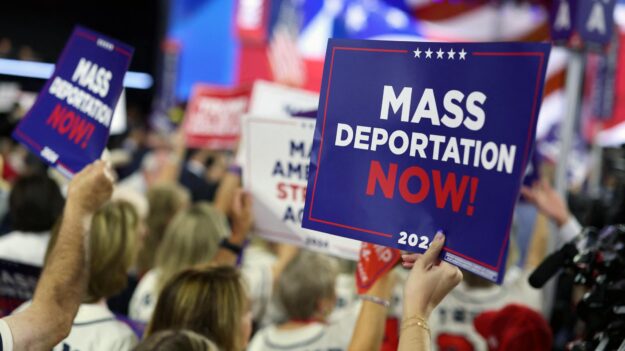Widgetized Section
Go to Admin » Appearance » Widgets » and move Gabfire Widget: Social into that MastheadOverlay zone
Opinion: Trump win may spark recession if he delivers on deportations, tariffs

As I watched Donald Trump arrive at an astounding victory election night, I was struck by his strong turnout in both rural and urban parts of the country. But I couldn’t stop thinking: Do voters understand what Trump’s sweep means for the price of eggs, housing and cars?

As it became clear that enthusiasm for Kamala Harris was waning leading up to the election, bond markets were already going down. That’s important, because the bond market is a predictor of the future.
For contrast, the stock market went up 3% the morning after the election, as Donald Trump promised dramatic tax breaks and lenient environmental regulations for corporations. That explains why so many billionaires supported Trump.
Our bond market, perhaps not as well understood as stocks, is the biggest in the world, and though the Federal Reserve sets a “target” interest rate and regulates short-term interest rates.
The nation’s $28 trillion treasury market sets the final interest rate through an auction.
Here’s what an auction determines: When prices of bonds drop, yields for investors go up. But this also drives up mortgage rates, interest rates on car loans, credit cards and so forth. Foreign countries and investors also trade bonds based on expectations for future borrowing. If our government needs to sell more bonds, lower prices and higher rates of return to investors usually follow.
America is piling up huge annual deficits, and when buyers of our bonds grow concerned about the credit worthiness of the United States, they typically start selling. This creates a knock-on effect of higher deficits, as the nation pays higher interest rates on its massive borrowing.
Never downplay the impact a falling bond markets can have. Bond traders have toppled governments—Great Britain in 2022 is a prime example, reinforcing bond traders nickname “bond vigilantes.”
After Donald Trump was elected, the bond market, which had already declined significantly in anticipation of his win, fell 3% the next morning. That is considered a very bad day for the bond market. Investors began predicting that two of Donald Trump’s election promises would lead to higher prices for consumers.
His first promise was to deport millions of undocumented workers even though our country is at full employment. Deporting workers will cause a labor shortage and drive up the cost of American made goods, especially the cost of vegetables, meat and housing, industries that rely heavily on manual labor.
His second promise, using presidential power to impose tariffs on goods from other countries, is another way a president can raise costs for consumers. The president-elect has talked up tariffs repeatedly, calling them “beautiful” and promising that other countries will pay for them.
That is not how tariffs work.
If we want foreign goods from China and Mexico, we must pay the going rate. If we want to substitute an American good, we should be sure it’s available and that there is labor to produce it.
During his last presidency, Trump levied tariffs on China. It retaliated by levying tariffs on our farm products, which erased profits for midwestern farmers.
Trump quickly reallocated $12 billion via the U.S. Agriculture Department to support those farmers. That is called a bailout, or welfare.
Moreover, if he raises tariffs across the board on goods from other countries, there will be widespread “revenge- tariffs”—just as happened last time. Unless we borrow even more money in the bond market for various welfare schemes, the tariffs will harm the smallest American companies, while international corporations, with operations overseas, will be less impacted.
Once again farmers will be hurt. We are mostly a nation of consumers, not producers, and 68% of our economy is buying goods. That is why so many suffered during the inflationary spike under Joe Biden, causing the necessary goods in life to become shockingly pricey.
When Donald Trump takes charge next year—and if he fulfills his promises—tariffs and labor shortages are bound to dramatically raise prices and interest rates for American consumers. Once an economy contracts, recession follows.
Somehow, we missed thoroughly debunking Donald Trump’s wrongheaded assumptions about what makes our economy work. Now, we face an uncertain future with a leader whose policies benefit the rich while harming working people.
Dave Marston is the publisher of Writers on the Range, a nonprofit dedicated to lively discussion about the West. He worked in finance in New York City and now lives in Durango, Colorado.
Dave Marston
Latest posts by Dave Marston (see all)
- Opinion: Trump win may spark recession if he delivers on deportations, tariffs - November 11, 2024


